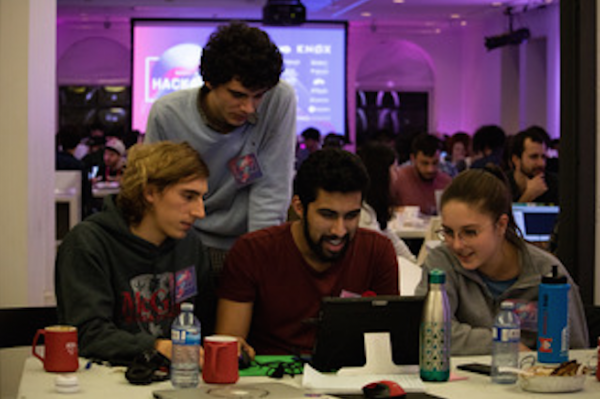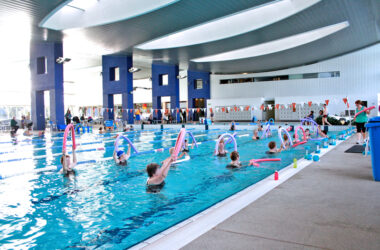“I think everyone wins, and that’s not just a fluff sentence,” Nikolas Provatas, professor in the Department of Physics, said at McGill’s Physics Hackathon. “Everyone wins just by being here. If they go back home and they have something positive to say about science, to me, that’s a success.”
From Nov. 3 to 4, 120 eager hackathon participants were assigned to teams of two to five members to collaborate and solve any physics problem of their choosing.
“The idea is [to] come and hack a solution to a problem you think is interesting [….] At this high level, we try to limit it to some kind of fusion of science, arts, and creativity,” Provatas said. “At the end of the Hackathon, a panel of judges will go around the room, and you have five minutes to sell your hack.”
Participants designed projects able to solve a variety of problems. From finding a way to determine the most fuel-efficient route between two points to modelling Fresnel diffraction and distinguishing patterns created by waves when light is shown through a narrow opening, the projects were diverse. McGill University student Louis Richez, U2 Science, and his team began the hackathon with a preconceived idea: To design a program that is able to process images of handwritten numbers, particularly whether someone has written a three or a seven.
“We are classifying images of hand-drawn digits, particularly digits three and seven,” Richez said. “For each picture of a three or a seven, the neural network will try to identify it as a three or seven [….] The perturbations we are adding are to make the distinctions in the original images more ambiguous, so making threes look more like sevens and sevens more like threes and testing to see whether the network can still distinguish the images.”
Participation was open to high school students through to PhD candidates and most participants hailed from schools in either Quebec or Ontario. The Hackathon encouraged students of any background or specialization to register, offering a chance for younger or non-STEM students to spend a 25-hours learning from their more experienced counterparts.
“Let’s be honest,” Danylo Perkov, a grade 11 student at l’École secondaire Félix-Leclerc, said of the marathon coding event. “In a normal week, with all the activities and the homework, we don’t have much time to just sit and concentrate on a program. It [provides] an opportunity to bring everyone together in one place where we can work together constantly without other [interferences].”
At the end of the competition, judges assessed the final projects not just on technical ability, but also the respective team’s presentation quality and teamwork. The judging process was guided by each team’s individual skill level and experience, providing opportunity for young and inexperienced hackers to compete alongside their more advanced peers. The fair judging method levelling of the playing field allowed for a team of CEGEP students who modelled Fresnel diffraction to finish the competition in first place.
An enthusiastic team of nine organizers spent six months preparing for the event. At the Phi Centre in Montreal’s Old Port, an additional 20 mentors, many of whom were prize-winning participants of years past, joined the team. The hackathon hosted presentations by their partners including Google throughout the event, which also featured introductory workshops on Arduino, Python, and Machine Learning.









